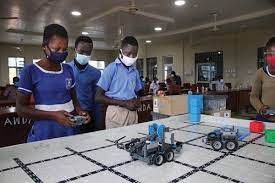THE CRISIS IN GHANA EDUCATION SYSTEM
Chapter 5 - Current status of the Education system in Ghana

The present structure of education, which starts at the age of 6 years, is a 6-3-3-4 structure representing, 6 years of primary education, 3 years of Junior Secondary School, 3 years of Senior Secondary School and 4 years University course. Naturally students who successfully pass the Senior Secondary School Certificate examination can also follow courses at a Polytechnic, Teachers Training College or other tertiary institutions.
As mentioned earlier on, the first 9 years form the basic education and is free and compulsory. The basic education is designed to expose children to a wide variety of ideas and skills and install attitudes that will help them cope creatively with their environment and stimulate them to be an asset to their country.
The curriculum used in schools is work-oriented. The Primary School level curriculum consists of English, Ghanaian language and Culture, Mathematics, Environmental studies, Integrated Science, Religious and Moral Education and physical activities such as Music, Dance and Physical Education. The Junior Secondary School level makes a distinction between Agricultural and General science and incorporates subjects such as Pre- vocational Skills and Pre-technical skills. Also Social Studies and French as a 3rd language are added.
The Senior Secondary School curriculum has Core subjects and Elective subjects. Every student takes four core subjects: English language, Mathematics, Integrated Science (incl. Science, Agriculture and Environmental studies) and Social Studies (economics, geography, history and government). Students also choose 3 elective subjects from 5 available programs: Agriculture Program, General Program (Arts or Science option), Business Program, Vocational Program and Technical program.
Basic and Senior Secondary School run a 40 week school year and students are tested using an internal continuous assessment (30% of final score) and an external examination conducted by the West African Examinations Council (70% of final score).
